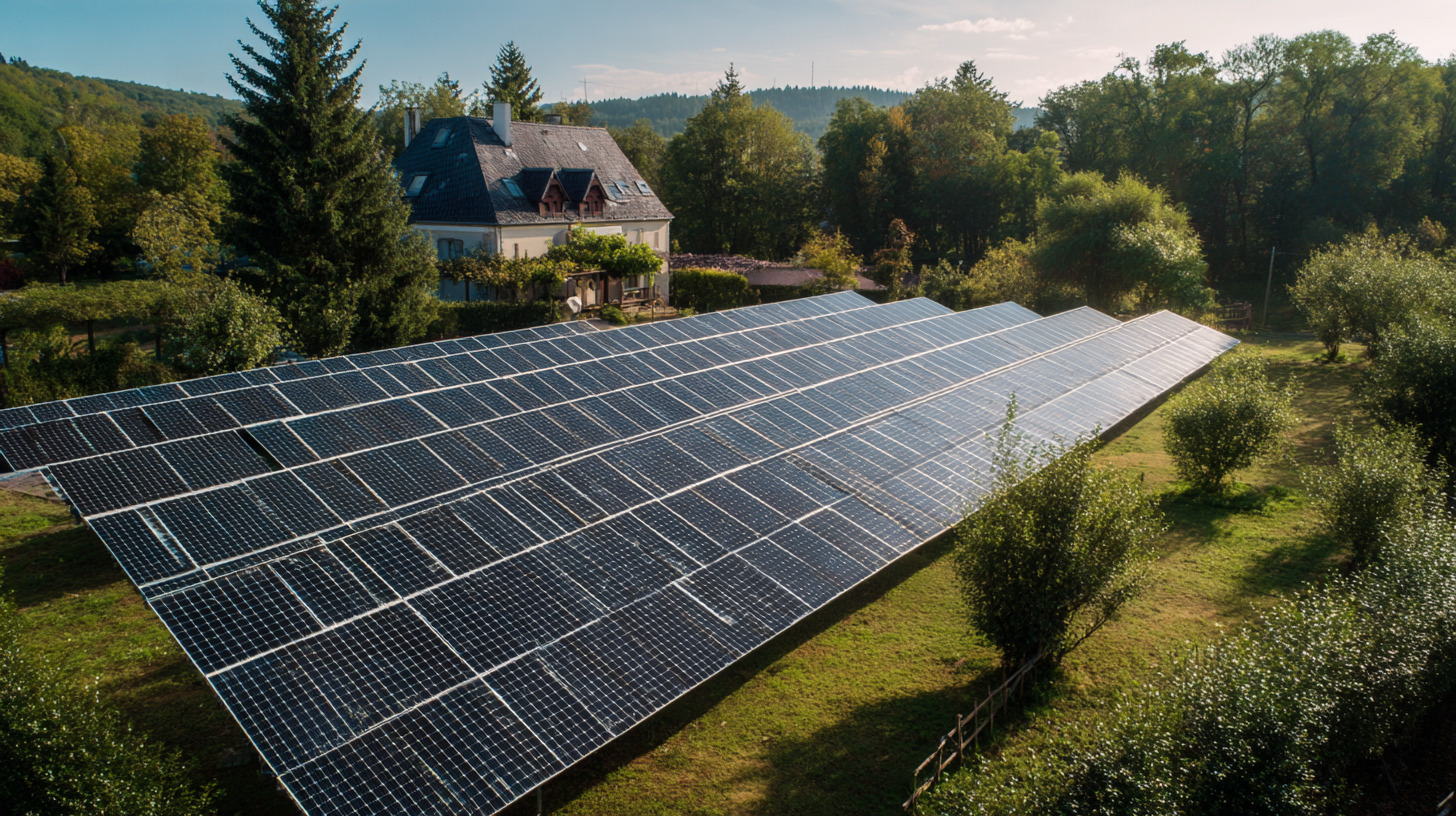
Blog
Top 5 Benefits of Solar Green Technology for Sustainable Energy Solutions
 In today's quest for sustainable energy solutions, the adoption of solar green technology stands out as a pivotal approach towards achieving environmental and economic stability. According to Dr. Emily Harper, a renowned solar energy expert, "The transition to solar green technology is not just a choice; it's a necessity for a sustainable future." This statement encapsulates the urgency of implementing solar green innovations that harness the power of the sun while reducing our carbon footprint.
In today's quest for sustainable energy solutions, the adoption of solar green technology stands out as a pivotal approach towards achieving environmental and economic stability. According to Dr. Emily Harper, a renowned solar energy expert, "The transition to solar green technology is not just a choice; it's a necessity for a sustainable future." This statement encapsulates the urgency of implementing solar green innovations that harness the power of the sun while reducing our carbon footprint.
The benefits of solar green technology extend beyond mere energy production; they include a reduction in greenhouse gas emissions, lower utility bills, and the promotion of energy independence. As communities and governments increasingly recognize the importance of transitioning to renewable energy sources, solar green technology emerges as a frontrunner. It offers innovative solutions that not only meet the growing energy demands but also align with global efforts to combat climate change.
With the rising tide of environmental awareness, understanding the top benefits of solar green technology is essential for pushing the envelope on sustainable energy initiatives. As we delve into the five key advantages, it becomes clear that the future of energy lies in harnessing the sun's potential while promoting a healthier planet for generations to come.
Advantages of Solar Green Technology for Reducing Carbon Footprint
Solar green technology offers significant advantages in the quest to reduce our carbon footprint, making it an essential component of sustainable energy solutions. By harnessing the sun's energy, solar power drastically reduces reliance on fossil fuels, which are major contributors to greenhouse gas emissions.
This transition not only cuts down on carbon emissions during energy production but also encourages a shift toward cleaner alternatives in manufacturing and transportation.
In addition to lowering emissions, solar green technology fosters energy efficiency. Solar panels convert sunlight directly into electricity, providing a renewable source of energy that can be used at homes, businesses, and even in electric vehicles. This localized energy production eliminates energy loss associated with long-distance energy transmission and encourages communities to adopt sustainable practices. By embracing solar technology, individuals and organizations can significantly lessen their environmental impact and play a vital role in combating climate change.
Innovative Energy Efficiency: How Solar Solutions Transform Residential Power Use
Innovative energy efficiency driven by solar solutions is reshaping residential power use, ultimately leading to a more sustainable energy future. As cities in the Asia-Pacific region embrace green urban energy solutions, the integration of solar technologies into everyday life becomes increasingly vital. Electric buses and trains are redefining public transportation, while advancements in solar battery technology promise to enhance residential energy storage and reliability. Such innovations ensure that households can harness renewable energy effectively, even during periods of low sunlight.

Moreover, developments in solar energy, such as multicolored solar panels and perovskite cells, signal a new era of aesthetics and functionality. These innovations not only provide clean energy alternatives but also transform buildings into stylish power sources. The emergence of solar-powered clothing further illustrates the versatility of solar technology, allowing individuals to wear their energy source. With these advancements, the potential for residential solar solutions continues to grow, promoting energy independence and fostering a more sustainable lifestyle.
Economic Benefits of Investing in Solar Energy for Homeowners and Businesses
Investing in solar energy has become increasingly recognized as a smart financial move for both homeowners and businesses. A recent survey revealed that 75% of participants view solar panels as a worthwhile investment, highlighting the growing confidence in solar technology. One of the primary economic benefits is the considerable savings on electricity bills. Homeowners and businesses that invest in solar systems can reduce their reliance on grid electricity, leading to substantial long-term savings. Additionally, several states offer residential solar investment tax credits, which further enhance the financial appeal of solar energy. This direct financial incentive can significantly lower the upfront costs associated with solar installation.
Moreover, the shift towards renewable energy sources like solar is also tied to broader economic benefits for the community. Transitioning to solar energy supports job creation within the renewable energy sector, which has grown rapidly in recent years. According to industry reports, the solar industry alone has generated hundreds of thousands of jobs nationwide, providing employment opportunities in installation, maintenance, and technology development. As more consumers recognize these advantages, the continued support for residential solar investment tax credits becomes critical, particularly in states like South Carolina, where companies advocate for policies that ensure a bright future for solar energy investments.
Enhancing Energy Independence Through Solar Green Technology Solutions
There has been a significant shift towards solar green technology as a viable solution for enhancing energy independence. By harnessing the power of the sun, individuals and communities can reduce their reliance on traditional fossil fuels, which are often subject to price volatility and geopolitical tensions. This renewable energy source not only provides a stable and long-term energy solution, but it also allows users to generate their own electricity, empowering them to take control of their energy needs.
Moreover, the widespread adoption of solar technology contributes to a decentralized energy model. This means that regions can become less dependent on centralized power grids, which can be vulnerable to outages and disruptions. As solar installations become more common, cities and rural areas alike can benefit from localized energy production, leading to an increased resilience in energy supply.
This transformation is vital for fostering energy independence and advancing sustainable energy solutions, ultimately resulting in a cleaner and more self-sufficient future for all.
Long-term Environmental Impact of Adopting Solar Energy Systems
The global solar market is projected to grow significantly, expanding from an estimated $266.57 billion in 2024 to $410.17 billion by 2031, with a compound annual growth rate (CAGR) of 6.35%. This growth trajectory highlights the increasing importance of solar energy as a sustainable solution for energy demands. As more countries and communities invest in solar photovoltaic (PV) systems, the environmental impact of these technologies becomes paramount, driving advancements in energy efficiency and cost-effectiveness.

Furthermore, the development of recycling technologies for solar panels is poised to enhance the long-term environmental sustainability of solar energy. With the global solar PV recycling market anticipated to experience significant expansion between 2025 and 2034, regulatory and environmental pressures will shape the industry. Advances in recycling methods not only promote sustainability but also ensure that the overall lifecycle of solar technologies is managed responsibly, minimizing waste and resource use. This evolution in the solar sector underscores a critical shift towards sustainability and environmental stewardship in energy solutions.
Related Posts
-

Ultimate Checklist for Choosing the Right Solar Power Solutions for Your Business Needs
-

Navigating the Future of Best Sustainable Energy Solutions in 2025 with Practical How to Strategies
-

Comparing Top Green Energy Solutions for Sustainable Business Practices
-

Understanding the Advantages of Best Solar Structure Solutions
-

Achieving Export Certification for the Best Solar Structures: A Step-by-Step Guide
-

Evaluating the Ecological Benefits of Green Power vs Traditional Energy Sources: A Comprehensive Comparison